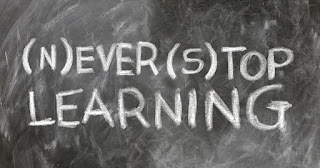On pedagogy: I of II
I'm gradually
working through Matt Bower's Design oftechnology-enhanced learning. I'd have read it by now but for the desire
to take it reflectively and to blog my thoughts and impressions, which is
actually a solid endorsement for Matt's work! It's given me the opportunity to
consider my own perspectives of TEL based on the ideas of someone who's clearly
given it a lot of thought, and who has a broad, coherent view as to its
effective practice.
This is post 1 of 2;
this first sets out my own perspective of pedagogy as a step toward
consideration of Matt's chapter called "Pedagogy and Technology-Enhanced
Learning". The next post will
consider the -isms Matt discusses in his third chapter.
So, in his third
chapter, Bower confronts the spectre of pedagogy.
I say spectre, because it's a word with mixed reviews in my experience; people
either assume they know enough about what it is, or else have never heard of
it. When it comes to pedagogy, you're either an expert or someone new to the
term. Unfortunately pedagogy is a rather bruised, taken-for-granted term.
Consider these responses that I've encountered:
- "Oh, what you really mean is andragogy."
- "We need to move away from behaviourism, because people construct their own knowledge - so I'm a social constructivist."
- "Effective pedagogy means…
- …having people learn for themselves."
- …freeing the minds of the oppressed."
- …connecting people with one another."
- …learning at the feet of experts."
- "Oh, that. Every academic knows about that."
- "Huh?"

All of these
responses came from very intelligent people! Yet often, once the surface is
scratched, it's difficult to explore their understanding at any deeper
level.
Part of my
background is evangelical theology. One of the first things you learn in
theology 101 is that everyone is a theologian. Everyone has a series of beliefs
about God. Few people have ever written a systematic theology detailing their
beliefs, but everyone is a theologian in that everyone has an opinion about theology. In the same way, everyone with opinions about teaching is a pedagogue. Everyone has
assumptions around what makes for good teaching and learning, but many of these
actually rest on the surface. Part of the problem is that we do not have a good
vocabulary for discussing pedagogy among practitioners.
The Oxford dictionary defines pedagogy as "the method and practice of teaching,
especially as an academic subject or theoretical concept". Drawing from
this it's clear that pedagogy is certainly a method and practice - yet it is
also an academic subject in itself. Pedagogy is both practice and theory, and
we tend to emphasise the practice and ignore the theory. There is a breadth and
depth to pedagogy as a theoretical concept that goes far beyond what might be
summed up in a blog post - or a book chapter, for that matter! So, by
necessity, in chapter three Matt picks up on one particular aspect of pedagogy
- learning theory. And, I reckon he does
a pretty good job. More on that next post. For now, I want to explore some
issues that occur to me based on my previous encounters with the term pedagogy.
Is pedagogy optional?
In the same way that
everyone is a theologian regardless of what one thinks about God, the answer to
the question "is pedagogy optional?" in any teaching and learning
activity is no. When you consider the
existence or character of God, you are applying theological thought; likewise,
whenever you engage with teaching, you express pedagogy. Unfortunately, the
likes of the Wikipedia rendition of pedagogy as "the discipline that deals
with the theory and practice of teaching and how these influence student
learning", which "informs
teacher actions, judgments, and teaching strategies…" is rather misleading
in this regard. Any teacher action and teaching strategy is an expression of
pedagogy, whether that pedagogy is deliberately constructed or is simply left
to chance. Pedagogy does not need to inform teacher actions, but it is
certainly reflected in them. Applying a thoughtful, deliberate and critical
approach to pedagogy in a particular teaching and learning situation is
optional; applying pedagogy is not.
Is there a perfect pedagogy?
The answer to this
must be no. There are simply too many situational variables to what constitutes
effective learning and how learning might be made available to provide an
affirmative answer. By way of example, the perfect pedagogy for learning
English might be growing up in a country where English is the spoken language;
clearly this is not terrifically helpful as a pedagogical solution for those
having grown up elsewhere wanting to learn English. Likewise, what might be
perfect for learning engineering may not be perfect for learning social
sciences. Yet, even within these disciplines, multiple approaches might work
best. And, as Knowles rightly identifies in his work on the adult learner,
adults benefit from different, err, pedagogical
approaches than do children…
How do we best determine what pedagogy we might apply?
Through reflection,
conversation, research, debate and - perhaps most importantly - collaboration.
In my previous post on TPACK I explore what this might resemble in ODE TEL.
Pedagogy deserves far more thought and engagement than we tend to give it in teaching
and learning. Spoiler alert for the next post, learning outcomes - rather than
learning theory preference - provide the best filter for thinking about which
pedagogies might best serve a given teaching intervention.
What are the various elements of pedagogy?
There are many… as mentioned above learning theory is the element pedagogy is most identified with, and it is this
that Bower turns to in his third chapter. But curriculum design, political
theory, power dynamics and educational philosophy all add important dimensions
to the study of pedagogy as an academic discipline. Many disciplines or subject
areas also claim to have their own particular pedagogy.



Comments
Post a Comment